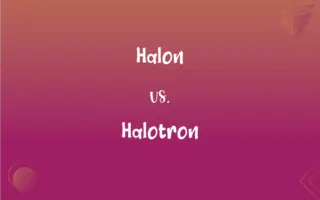Bioprospecting vs. Biopiracy: What's the Difference?
By Harlon Moss & Aimie Carlson || Updated on May 22, 2024
Bioprospecting is the exploration of natural resources for commercially valuable genetic and biochemical properties, whereas biopiracy involves the unethical or unauthorized use of these resources, often without compensation to indigenous communities.

Key Differences
Bioprospecting involves the systematic search for natural substances that can be used in pharmaceuticals, agriculture, and other industries. It is a legitimate scientific endeavor conducted by researchers and companies to discover new products. In contrast, biopiracy refers to the exploitation of these resources without proper authorization or compensation, often disregarding the rights and knowledge of indigenous communities.
Bioprospecting can lead to significant advancements in medicine, such as the development of new drugs and therapies. This process typically involves partnerships with local communities and follows legal frameworks and ethical guidelines. On the other hand, biopiracy bypasses these legal and ethical standards, resulting in the theft of indigenous knowledge and resources. It often leads to legal disputes and international condemnation.
In bioprospecting, agreements such as Access and Benefit-Sharing (ABS) ensure that benefits derived from the use of genetic resources are shared fairly with the source countries and communities. Conversely, biopiracy often involves multinational corporations taking resources from developing countries without any return benefits, leading to economic and social injustices.
The aim of bioprospecting is to create sustainable and mutually beneficial relationships between researchers and local communities. This contrasts with biopiracy, which focuses on maximizing profit without regard for sustainability or fairness. This unethical practice can harm biodiversity and undermine trust between scientists and indigenous populations.
Comparison Chart
Definition
Exploration for valuable genetic and biochemical resources
Unauthorized exploitation of genetic and biochemical resources
ADVERTISEMENT
Legal Framework
Operates under legal agreements and ethical guidelines
Bypasses legal and ethical standards
Relationship with Communities
Involves partnerships and benefit-sharing
Ignores or exploits local communities
Economic Impact
Can lead to shared economic benefits
Often results in economic injustices
Sustainability
Aims for sustainable use of resources
Focuses on profit, often harming sustainability
Bioprospecting and Biopiracy Definitions
Bioprospecting
A scientific investigation of ecosystems for valuable genetic materials.
Researchers are bioprospecting in the rainforest for potential cancer treatments.
ADVERTISEMENT
Biopiracy
Unauthorized exploitation of natural resources and indigenous knowledge.
The pharmaceutical company was accused of biopiracy by the local community.
Bioprospecting
The exploration of natural resources for commercial purposes.
The company engaged in bioprospecting to find new medicinal plants.
Biopiracy
Exploiting natural resources disregarding indigenous rights.
Activists campaigned against biopiracy to protect the rights of native peoples.
Bioprospecting
Searching for new biochemical compounds in nature.
Bioprospecting led to the discovery of a novel antibiotic.
Biopiracy
The unethical appropriation of native biological materials.
The case of biopiracy involved taking plants from the forest without permission.
Bioprospecting
A method to find natural resources for pharmaceuticals and agriculture.
Bioprospecting has become essential for developing new crop varieties.
Biopiracy
Stealing genetic resources without fair compensation.
Biopiracy led to the loss of traditional knowledge without any benefits to the community.
Bioprospecting
Analyzing biodiversity for commercially viable substances.
Bioprospecting efforts revealed a unique enzyme useful in biofuels.
Biopiracy
Using genetic resources without legal agreements.
Biopiracy is a major concern for countries rich in biodiversity.
Bioprospecting
The attempt to discover in living organisms biochemicals or genetic sequences that have medical, agricultural, or industrial value.
Biopiracy
The commercial development of biological compounds or genetic sequences by a technologically advanced country or organization without obtaining consent from or providing fair compensation to the peoples or nations in whose territory the materials were discovered.
Bioprospecting
(biology) The methodical search for novel pharmaceutical (and other) products from plants and microorganisms.
Biopiracy
(pejorative) The appropriation of indigenous biomedical knowledge, especially by patenting naturally occurring substances.
Biopiracy
Biological theft; illegal collection of indigenous plants by corporations who patent them for their own use
FAQs
Why is biopiracy considered unethical?
It exploits natural resources and indigenous knowledge without proper authorization or compensation.
What is bioprospecting?
Bioprospecting is the exploration of natural resources for commercially valuable genetic and biochemical properties.
How does bioprospecting benefit communities?
It involves legal agreements that ensure benefits are shared with source countries and communities.
Is biopiracy illegal?
Yes, biopiracy is illegal as it violates international agreements and local laws.
What legal frameworks support bioprospecting?
Agreements like Access and Benefit-Sharing (ABS) under the Convention on Biological Diversity support bioprospecting.
What is biopiracy?
Biopiracy involves the unethical or unauthorized use of genetic and biochemical resources, often without compensation to indigenous communities.
What is an example of bioprospecting?
Searching rainforests for plants with potential medicinal properties is an example of bioprospecting.
How does biopiracy affect indigenous communities?
It often leads to economic and social injustices by exploiting their resources without fair compensation.
What is the main goal of bioprospecting?
To create sustainable and mutually beneficial relationships between researchers and local communities.
How can bioprospecting be sustainable?
By following legal and ethical guidelines and ensuring benefit-sharing with local communities.
What are the ethical concerns with bioprospecting?
Ensuring fair compensation and respect for indigenous knowledge are key ethical concerns.
What are the benefits of bioprospecting for biodiversity?
It can promote conservation by highlighting the value of preserving natural ecosystems.
What are the consequences of biopiracy?
It can result in legal disputes, international condemnation, and loss of biodiversity.
What role do indigenous communities play in bioprospecting?
They provide valuable knowledge and resources that are essential for bioprospecting.
How is biopiracy related to intellectual property rights?
Biopiracy often involves the misappropriation of traditional knowledge without recognizing intellectual property rights.
Can bioprospecting lead to new medicines?
Yes, bioprospecting has led to the discovery of many new drugs and therapies.
What is an example of biopiracy?
A company taking genetic materials from a country without permission and profiting from it is an example of biopiracy.
How does biopiracy undermine trust?
It damages trust between scientists and indigenous populations by disregarding their rights.
Why is benefit-sharing important in bioprospecting?
It ensures that the communities providing the resources are fairly compensated and supported.
Can bioprospecting be regulated?
Yes, through international agreements and national laws that promote fair and equitable sharing of benefits.
About Author
Written by
Harlon MossHarlon is a seasoned quality moderator and accomplished content writer for Difference Wiki. An alumnus of the prestigious University of California, he earned his degree in Computer Science. Leveraging his academic background, Harlon brings a meticulous and informed perspective to his work, ensuring content accuracy and excellence.
Co-written by
Aimie CarlsonAimie Carlson, holding a master's degree in English literature, is a fervent English language enthusiast. She lends her writing talents to Difference Wiki, a prominent website that specializes in comparisons, offering readers insightful analyses that both captivate and inform.








































































